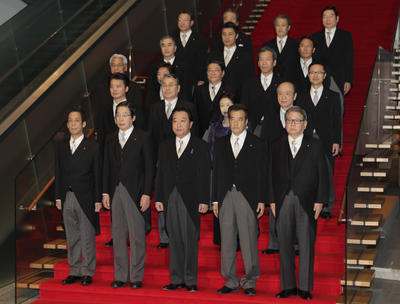Noda’s approach contrasted with his predecessor, Naoto Kan, who followed a ‘datsu Ozawa’ line and sought to exclude Ozawa’s influence from his administration. The result was a series of furious internecine disputes. Ostensibly the fights were about policy; in reality they arose from Ozawa’s grievances about the distribution of power within the party.
If Noda’s first cabinet was selected to keep Ozawa at bay, his recently appointed second cabinet aims to placate the opposition by getting rid of offending ministers. Defence Minister Yasuo Ichikawa and Consumer Affairs Minister Kenji Yamaoka, against whom the upper house passed censure motions last year, were both demoted. By these actions, Noda has kept alive the possibility of constructive negotiations with the opposition on a proposed consumption tax and social welfare-reform legislation. But the opposition will find it hard to agree on any legislation unless they see direct political advantage in doing so. Their primary objective is to bring down the Noda government and force a general election.
Noda paid the price for intra-party harmony the first time round. He appointed Ichikawa and Yamaoka not on the basis of their policy experience or political nous but because of their strong political connections to Ozawa. He also went for political balance in the party, choosing not only Azuma Koshiishi — one of Ozawa’s major supporters and defenders — as DPJ secretary-general, but also anti-Ozawa stalwart Seiji Maehara as chairman of a strengthened DPJ Policy Affairs Research Council.
Noda has also continued the trend begun under Kan toward decentralising the policy-making process, thus strengthening the role of the party as a separate policy organ. These changes reversed earlier reforms instituted under the Hatoyama administration, which sought to centralise policy making in the cabinet and reinforce the prime minister’s executive powers by establishing entities such as the National Policy Unit. By prioritising consensus within the government and the ruling Democratic Party of Japan (DPJ), Noda successfully undercut the executive policy-making power of the Kantei and the cabinet. Unfortunately, Noda soon realised that his administration needed more executive power to carry out difficult tasks such as increasing the consumption tax and engineering Japan’s membership of the Trans-Pacific Partnership. Ozawa’s cronies had begun using the consumption tax issue as an excuse to jump ship and form another political party (New Party Kizuna), in addition to another new party led by former Diet member and convicted felon Muneo Suzuki (New Party Daichi-True Democratic Party), which has enlisted two key ex-DPJ Ozawa supporters to its ranks. All the while, Ozawa’s previously muted criticisms have been growing louder and his behind-the-scenes machinations for possible party realignment more apparent.
Now Noda has sought to swing the pendulum back the other way with the appointment of Okada as Deputy Prime Minister and simultaneously to a whole host of other ministerial positions. Okada’s selection signals that Noda feels the need to buttress his policy leadership, but his elevation may also be a sign that Noda recognises his own policy leadership is weak. Okada is the DPJ’s Koizumi — someone who acts on the basis of policy conviction, rather than from the careerist mentality of so many other Japanese politicians.
Okada will certainly add some ballast to the Noda administration, but the downside is that Okada’s policy convictions can lead him to act unilaterally, without clearance from fellow members of the government. Moreover, Ozawa is implacably opposed to Okada given their past dealings: Okada was the principal architect of Ozawa’s suspension from the DPJ in 2011. And even though Ozawa is engaged in a long-drawn-out trial over an alleged money–politics misdemeanour, a wounded lion can still be dangerous. His criticism of the Noda administration may now become stronger after the reshuffle, although it is unlikely to reach the intensity with which he sought to bring down the Kan administration.
It is possible that Noda has repeated his earlier mistake in appointing Naoki Tanaka to replace Yasuo Ichikawa as Minister of Defence. Both Tanaka and Ichikawa have strong connections to Ozawa. Noda made both appointments to appease Ozawa, but Ichikawa’s incompetence on the job came back to bite him. Tanaka has had a singularly undistinguished political career, with his biggest claim to fame being his connection to the Tanaka family — his father-in-law is a former prime minister and his wife Makiko also has a long career in politics. And though Tanaka’s most recent position was as a member of the Special Committee on Okinawa and Northern Problems, he is completely untried and untested in dealing with security issues involving the US.
Normally, cabinet reshuffles are undertaken to breathe new life into governments. It remains to be seen whether Noda’s new line-up achieves this objective. The overwhelming impression is that both Noda and his cabinets are only temporary. The new cabinet is not going to save the Noda government, just extend its life briefly. Its effect will be palliative rather than curative.
Aurelia George Mulgan is Professor at the University of New South Wales, Australian Defence Force Academy, Canberra.

